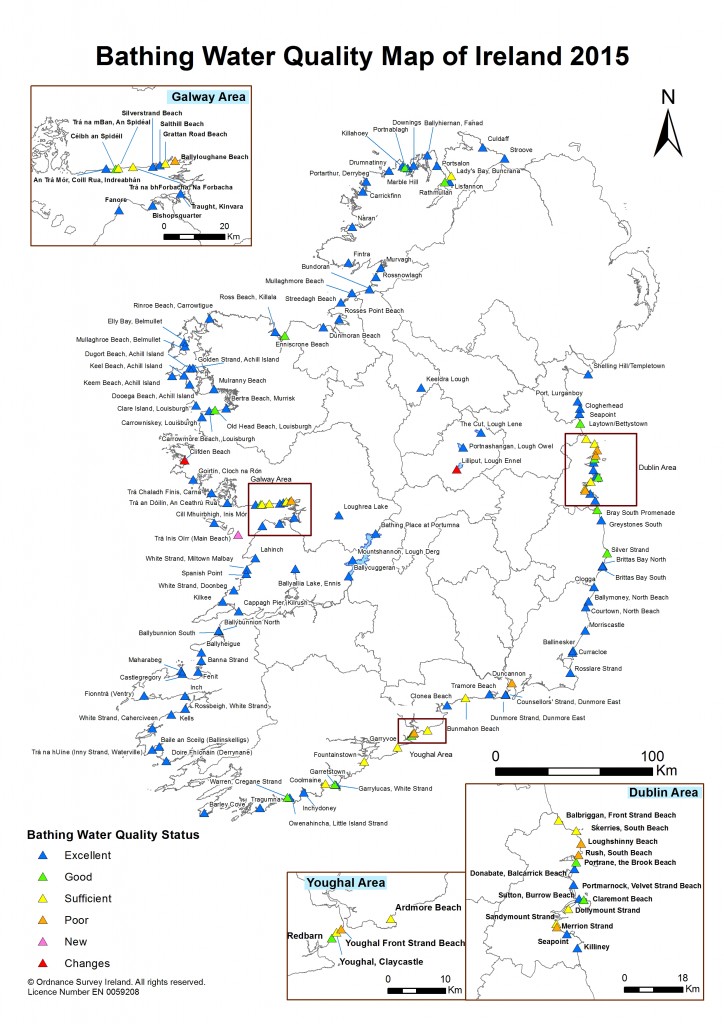Merrion Strand and Loughshinny Fail to Make a Splash in 2015 Bathing Water Quality Report

April 5th, 2016
The Environmental Protection Agency (EPA) today released the results of the 2015 Bathing Water Quality Report. The report examined bathing quality in inland and coastal areas, and showed largely unchanged results from the previous year, apart from two locations in Dublin, Merrion Strand and Loughshinny, that were newly designated as being of ‘poor’ quality.
 93% of the surveyed designated bathing areas met at least the minimum EU standard, and 101 of the 137 locations were classified as having ‘Excellent’ water quality, unchanged from the 2014 report. Of these results, Dr Matt Crowe, Director of the EPA’s Office of Evidence and Assessment said “despite a cool and, at times, wet and windy summer, the overall quality of Ireland’s bathing waters continues to be extremely good with the stricter standards providing a high level of protection for bathers”. 13 locations were classified as ‘good’ and a further 14 locations met the minimum standard of being ‘sufficient’. Those classified as ‘sufficient’ remain at risk of episodic pollution events throughout the season.
93% of the surveyed designated bathing areas met at least the minimum EU standard, and 101 of the 137 locations were classified as having ‘Excellent’ water quality, unchanged from the 2014 report. Of these results, Dr Matt Crowe, Director of the EPA’s Office of Evidence and Assessment said “despite a cool and, at times, wet and windy summer, the overall quality of Ireland’s bathing waters continues to be extremely good with the stricter standards providing a high level of protection for bathers”. 13 locations were classified as ‘good’ and a further 14 locations met the minimum standard of being ‘sufficient’. Those classified as ‘sufficient’ remain at risk of episodic pollution events throughout the season.
Microbiological pollution from a large presence of seabirds and the impacts from nearby streams are attributed as the causes for the ‘no bathing’ designation at Merrion Strand, whereas Loughshinny is purported to have fallen foul of testing directly after heavy rainfall, which would have lead to the presence of terrestrial run-off, combined with a general slight decrease in quality. In addition to the two newly designated locations of ‘poor’ quality, four other coastal locations previously classified as ‘poor’, failed to meet the minimum standards despite improvements in quality. They were Youghal (Front Strand), Duncannon, Rush (South Beach) and Ballyloughnane.
Dr. Crowe commented on the impact of the system of EPA testing criteria upon these, saying “the 4 year assessment means their classification is influenced by poorer results from 2012-2014 bathing seasons. The relevant local authorities, in conjunction with Irish Water, have management plans in place to tackle the main pollution risks at these beaches”. In the mean time, however, the public have been advised against bathing in these locations for the entire bathing season, which runs from the 1st of June until the 15th of September.
Two locations are currently between designation, meaning that they have shown significant improvements in water quality, but sufficient samples have yet to be collected to warrant a change in designation. Classified as ‘changes’, Clifden has improved since sewage infrastructure in the area has been updated, and the off-site treatment of waste water in Lilliput (Lough Ennel) has improved water quality at the location.
The EPA regularly displays up-to-date information regarding bathing quality throughout the season on the national bathing water website, Splash.epa.ie. Bathers are advised to check water quality on the website or at the twitter account @EPABathingWater.
[x_button shape=”square” size=”regular” float=”none” href=”http://www.irishtimes.com/news/ireland/irish-news/seagulls-10-times-more-polluting-to-beaches-than-people-1.2598074″ info=”none” info_place=”top” info_trigger=”hover”]Click here to check the water quality of the 137 designated bathing areas[/x_button]
[x_author title=”About the Author”]








